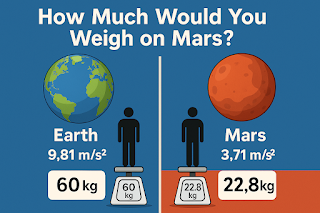Earth vs Mars: A Simple Comparison of Gravity
When we think about living on another planet, "one of the most important factors to consider is gravity". Gravity affects everything—from how we walk to how our bodies function over time. In this blog post, we’ll explore the difference in gravity between Earth and Mars, and why it matters for space travel and future human colonization.
Read More
Our Solar system
Earth vs Mars
Is it time travel possible!
Space-Time Fabric
The Unity of the Universe
🌍 Gravity on Earth
The gravity of Earth is what keeps us grounded—literally. It pulls everything toward the center of the planet, keeping our feet firmly on the ground. The standard gravitational force on Earth is:
9.81 meters per second squared (m/s²)
This is also known as 1g, and it’s the reference point for gravity across the universe.
🔴 Gravity on Mars
Mars, also known as the Red Planet, has much weaker gravity than Earth. The gravitational pull on Mars is:
3.71 meters per second squared (m/s²)
That’s only about 38% of Earth’s gravity, or 0.38g. So if you weighed 70 kg on Earth, you would weigh just 26.6 kg on Mars!
⚖️ Earth vs Mars Gravity Comparison
| Planet | Gravity (m/s²) | Percentage of Earth’s Gravity |
|---|---|---|
| Earth | 9.81 | 100% |
| Mars | 3.71 | 38% |
🚀 Why Does This Matter?
1. Movement and Strength
In lower gravity, you can jump higher, carry heavier loads more easily, and move with less effort. But over time, muscles and bones weaken, which is a big concern for astronauts and potential Martian settlers.
2. Space Missions
Understanding gravity is crucial for planning space missions, building habitats, and designing suits or vehicles for Mars. Everything from cooking to walking is different in 0.38g.
3. Human Health
Long exposure to low gravity can lead to muscle loss, bone density reduction, and balance issues. NASA and other space agencies are actively researching ways to counter these effects during long missions.
🌌 Final Thoughts
The gravity on Mars is just one of the many challenges and wonders of exploring space. As we look toward the future of space travel and colonization, understanding how gravity works on different planets is key. While Earth will always be home, Mars may be our next big step—and its gravity will shape that journey.

Comments
Post a Comment
Thanks for your comments